19 Feb Interview with the president of European Blues Union, Davide Grandi by Michael Limnios
Davide Grandi: The Caesar of Blues Galaxy by Michael Limnios
Inheriting the passion for the blues from his father Marino Grandi, one of the leading blues experts in Italy, he is dragged to various historic concerts around the world, having the opportunity to meet real sacred monsters. In 1982 he witnessed the birth in Milan of the magazine “Il Blues”, a quarterly of musical culture, but still remained linked to Particle Astrophysics and sport, Karate in particular. Between the Blues Foundation ‘s KBA award for the magazine, collected in Memphis in 2009, and participation in the adventure of the European Blues Union, an association that has been organizing the European Blues Challenge since 2011, the Travel For Fans project first saw the light in 2014, to bring fans to the places where African-American music was born, and then in 2015, AZ Blues. Since winter 2020 he has been hosting the Blues & Surroundings show on ADMR Rock Web Radio.
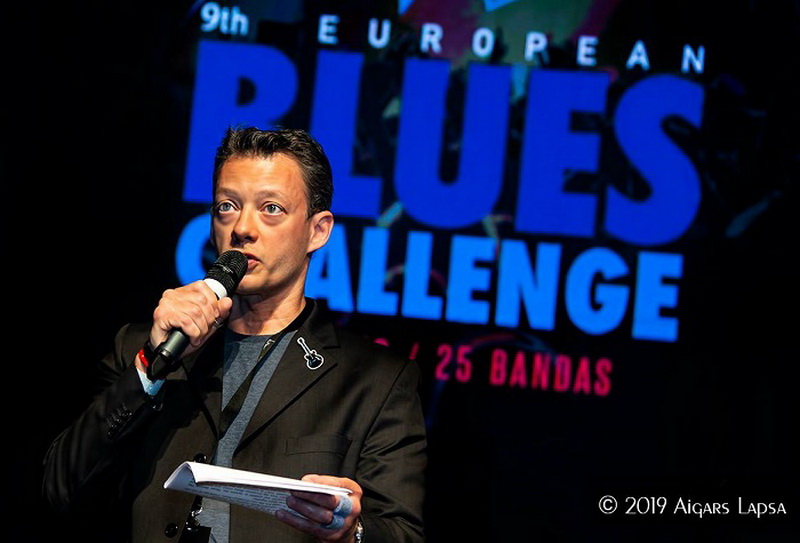
(Davide Grandi / Photo by Aigars Lapsa)
Davide says:
“I was born in 1970, during a period in which the blues, thanks mainly to Great Britain and France also, was spreading throughout Europe. Son of one for the main, if not the best, blues lovers and experts in Italy, Marino Grandi, I had the chance to see most of the old and well known bluesmen while I was a child (Johnny Shines in Milano, Luther Allison, Willie Dixon in Montreux and many many others), and I grew up listening to blues, soul, R&B and rock-blues. When just 12 years old I saw the birth of Il Blues, the first and still only Italian blues magazine, around a group of musicians, journalists and simple blues lovers, lead by my father Marino. Year after year, I gave my personal contribution to the Italian blues scene development, writing reviews and articles, going to the first Italian blues festivals, helping musicians like James Son Thomas or Roosevelt “Booba” Barnes to feel at home so many miles away from their country. Slowly but continuously I was involved in many projects related to the magazine and not, up to the new coming European Blues Union that, as I said many times, will probably help to overcome the usual local problems to develop a grid and a collaboration useful first of all to the music we love!”
Interview by Michael Limnios
Michael Limnios: How has the Blues music influenced your views of the world and the journeys you’ve taken?
Davide Grandi: It is very difficult to answer such a question because it’s like if I was really born with the blues. And with this expression I don’t mean that I’m a blues musician, (I can hardly ring a bell) but that even when I was still in my mothers’ belly I could listen to blues music, that my father was used to play with his records. So, I can’t imagine a single second without this music. And even if I followed different paths with my study, Astroparticle Physics, and my passion, sport and in particular Karate, I always had the twelve bars in my mind and in my heart. I had the privilege to see a lot of concerts with my parents when I was a child, and I continued to follow a lot of festivals and the magazine that my father started 40 years ago, in 1982, that Is almost like a little brother to me… So all what I have done, sometimes more sometimes less, has a blues taste in it… I can’t imagine a life without this music!
M.L.: A-Z Blues founded by you, Antonio Boschi and Lorenz Zadro. When and how did the idea of AZ Blues come about?
D.G.: My private company AZ Blues started 8 years ago, in 2015, with two very good friends that also became my partners in this business. The idea was to increase the professional level of blues musicians (and music) in Italy. We have such great talents but, for some unspecified reasons, it is still hard to consider this a “real job”. So we started to analyze the situation, both in Italy and around the world, and we tried to make a living with the music we love. It has been very hard, especially because when the Covid-19 pandemic started we were really starting to see a clear increase of our business, but also our core business had to change in relation to the experience we made. Now we usually skip the booking, except when we have to organize some big festival, and we concentrate all our efforts on press office, marketing and promotion. Our results are very good but, more important, we continue to remain open to improvements and never stop learning.
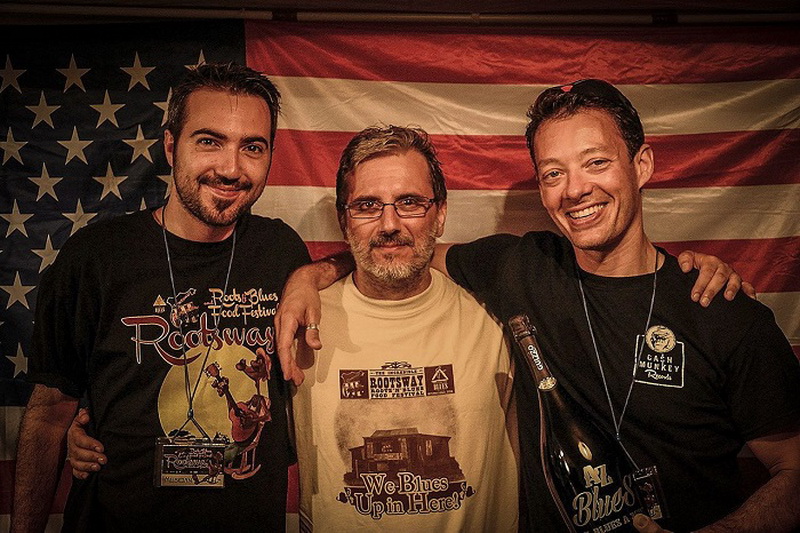
“I really think that the Blues music deserves more from all of us and from the “music business” so if I could change only one thing, that in my personal opinion is missing, is that professional and business view of this music.” (Photo: AZ Blues team are Davide Grandi, Antonio Boschi & Lorenz Zadro)
M.L.: You’re also the president of European Blues Union. What characterize EBU philosophy and mission?
D.G.: The European Blues Union is a different story, first of all because it’s a non-profit association, started more than 10 years ago, and also because is a transnational group of blues professionals, all working together to support the music we love. Sometimes this international behavior is even of great help in national contests, where local and personal interests often are a limit to build a network of festivals, clubs, associations and musicians to grow together. The EBU mission is the promotion of the blues in Europe and from Europe, and there are several activities that have been organized in these years to reach this goal. The main event we organize every year is the European Blues Challenge that, despite of its title, is a moment to bring together musicians from more than 20 different countries. In addition to this we developed the Blues Market, a moment for blues professional (festivals, booking agents, musicians) to do business, and we created the Blues Behind The Scenes Award, a prize for everyone that is working far from the stage lights but is essential for our music scene. Finally, we started to look at young generations, and every year we have some scholarships to support European musicians to attend the Little Steven Blues School in Notodden, Norway and the Pinetop Perkins Foundation Workshop in Clarksdale, Mississippi. We really believe that the future will be brighter only if we spread the blues word to young boys and girls!
M.L.: Why do you think that the European Blues Scene continues to generate such a devoted following?
D.G.: In my opinion the blues was, is and will be a very active music genre, with newcomers that will be a revolution for the old ones and will have to struggle to obtain the space they deserve. But it was always like that. Even when Robert Johnson was alive, or when Muddy Waters moved from acoustic to electric blues. Is a process impossible to stop, called evolution, time passing or history as you prefer, we can just do our best to learn from the past and get into the future without regrets. Moreover, the blues is a music that comes from feelings, and life problems, something that will (unfortunately) never end, so the young generation, with their particular taste of the blues, will always feel this sound very close to their hearts and use it to fight against the difficult situations they are living.
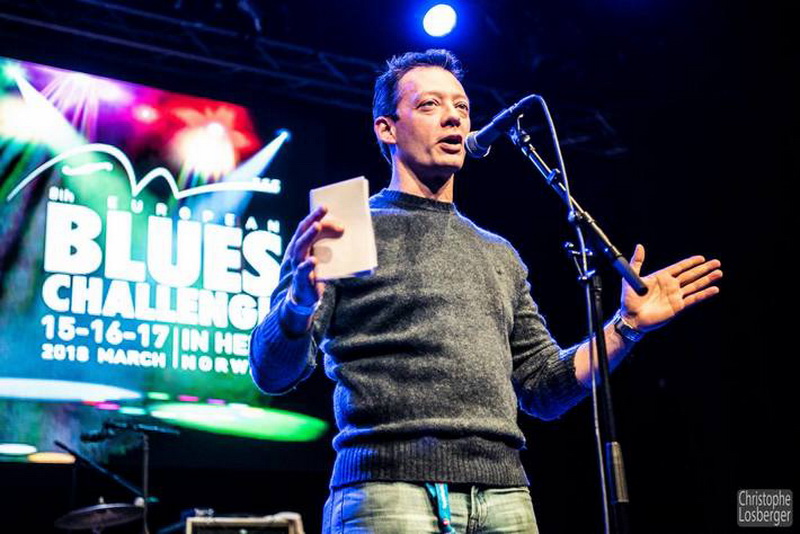
“I’m sure we have a lot of new blues musicians that are able to tell stories related to real life, and probably we miss them in the big sea of the internet. It is a little but more difficult, but we just need to dig a little deeper. I really believe every season has its tasty fruits and we have a lot of artistic power in the young generations!” (Davide Grandi / Photo by Christophe Losberger)
M.L. Are there any specific memories or highlights of your career that you would like to tell us about?!
D.G.: Actually, calling it a career is probably too much, I don’t consider myself like my father, that is the real blues expert in the family, and not even a VIP like the organizer of some well renown blues festival. I simply like what I’m doing, and I try to leave every place that I visit (and every job I’m doing) a little bit better than before. For this reason, I’m putting a lot of efforts even in small things. But if I have some moments to share they are probably related to when I was a young boy, going to blues festivals with my father, I had the chance to see Stevie Ray Vaughan in Montreux in 1982, or Willie Dixon again in Montreux in 1983. I met Johnny Shines in 1978 when he came to Italy for some concerts, or Luther Allison when I was a young boy. I also met John Lee Hooker, BB King, The Blues Brothers, Albert Collins and Albert King when I wasn’t yet 20 years old.. All those moments are somehow written in my soul, and what I’ve become is in many aspects due to the feelings and emotions I was so lucky to live with the blues.
M.L.: What are the most important lessons you have learned from the Italian blues guru (and your father) Marino Grandi?
D.G.: This question is very funny, because my father is not only one of the biggest blues experts in Italy, but is also one of the more innovative and, as I always call him, “punk” in his attitude. What I exactly mean is that if from one side he’s deeply rooted to country blues, and his stars are people like Fred McDowell, or Blind Willie Johnson, from the other side he’s always looking at what a musician has to say, no matter if acoustic, electric, solo or band. And this gave him an open mind to be able to overcome any definition or boundary of what is blues and what is not blues. This doesn’t mean that every music is blues (even if for some aspects I believe that) but that the Afro-American influence can be found in most of the songs that are part of our everyday life, if we carefully listen. The most important thing is the message, that is related to what every human being is searching since the beginning, happiness and love, and the way this message is brought to the audience. No matter of fast notes or acoustic/electric, just the feelings behind every song. Once we find this, we find the blues, I guess this is the most important lesson I’ve learned from my father.
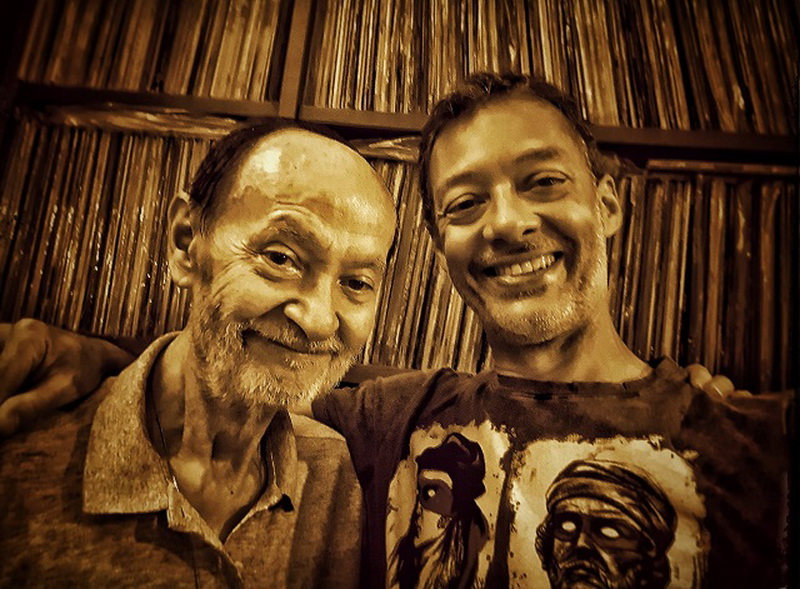
(Photo: Davide & Marino Grandi)
M.L.: What do you miss most nowadays from the blues of the past? What are your hopes and fears for the future of?
D.G.: We always miss what we lost, this feeling is deeply inside our human souls, but it is often a “fake” attitude, because when we were living that particular moment, usually we experienced not only good aspects but also bad ones. When time goes by, we just remember what is good and forget what is bad, it’s called conservation law, we can’t live with constant pain. What I miss is probably a little bit more of authentic stories behind the music, but this is also due to the increasing number of songs we can hear with all the online systems like spotify/youtube etc. If once upon a time it was real to sing about cotton fields and waking up in the morning and searching for your shoes, today the first thing we do is checking our mobile phone and go to our beloved social media to see if our post had a lot of likes… This is what todays’ blues is about. I’m sure we have a lot of new blues musicians that are able to tell stories related to real life, and probably we miss them in the big sea of the internet. It is a little but more difficult, but we just need to dig a little deeper. I really believe every season has its tasty fruits and we have a lot of artistic power in the young generations!
M.L.: If you could change one thing in the Blues world and it would become a reality, what would that be?
D.G.: I really think that the Blues music deserves more from all of us and from the “music business” so if I could change only one thing, that in my personal opinion is missing, is that professional and business view of this music. We are passionate lovers, but it is time to stop just considering it a hobby, because musicians (and all other people working in this like promoters, festivals, booking agents) need to make a living of it, so it must be considered a real job. This will also increase the music level and it is a process we need to preserve the blues and avoid its disappearing. This is what I’d change, the belief that being a blues musician means being poor and lonesome… This message is wrong, we should work all together to bring this fantastic music to a wider audience, and with a lot of efforts and education we can really increase our professional level.
M.L.: What is the impact of Blues on the socio-cultural implications? How do you want the Blues music to affect people?
(Davide Grandi / Photo by Sylvie Bosc)
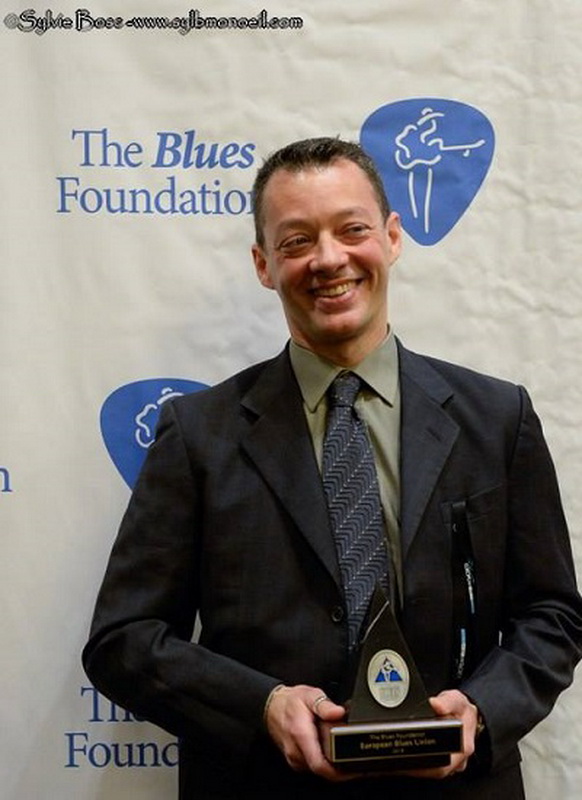 D.G.: As I said before the blues is always speaking about feelings and directly to the people’s heart. But this music was (and is in my opinion) a music for parties, it was always related to juke joints, rental parties, festivals, club concerts, moments of happiness and joy. This is the main impact, entertain people and let them also think about difficulties of life, but with a positive attitude to face another day. Let’s think for example at the Blues Dance that is growing interest in these last years… This is a social phenomenon related to the blues and is bringing people together to dance and have fun. All the big rock stars had a past in a blues band or were playing the blues somehow (Rolling Stones, Pink Floyd, Led Zeppelin, Bruce Springsteen and many others), and this not because this music is simple, but because it is immediately reaching the audience and touching their soul. The blues was also related to many social issues, always from the side of people that were mistreated and suffering, so its implications in our life is evident, we can live in democracy and freedom and this also thanks to all the blues musicians that were supporting the cause of equal rights. A world without the blues is really missing something…
D.G.: As I said before the blues is always speaking about feelings and directly to the people’s heart. But this music was (and is in my opinion) a music for parties, it was always related to juke joints, rental parties, festivals, club concerts, moments of happiness and joy. This is the main impact, entertain people and let them also think about difficulties of life, but with a positive attitude to face another day. Let’s think for example at the Blues Dance that is growing interest in these last years… This is a social phenomenon related to the blues and is bringing people together to dance and have fun. All the big rock stars had a past in a blues band or were playing the blues somehow (Rolling Stones, Pink Floyd, Led Zeppelin, Bruce Springsteen and many others), and this not because this music is simple, but because it is immediately reaching the audience and touching their soul. The blues was also related to many social issues, always from the side of people that were mistreated and suffering, so its implications in our life is evident, we can live in democracy and freedom and this also thanks to all the blues musicians that were supporting the cause of equal rights. A world without the blues is really missing something…




